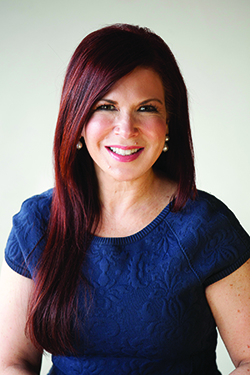Melanoma Survivor
Immunotherapy Offers New Hope Against Melanoma
 As a dermatologist, Dr. Vivian Bucay has seen a lot of skin abnormalities. So when her belly button became dry and flaky, she became concerned and did a biopsy. The results indicated she had a rare form of melanoma. After combining several therapies, she continues to practice dermatology in Texas and enjoy her life with her husband, Moises, and three adult daughters, Yemile, Daniela and Gabriela.
As a dermatologist, Dr. Vivian Bucay has seen a lot of skin abnormalities. So when her belly button became dry and flaky, she became concerned and did a biopsy. The results indicated she had a rare form of melanoma. After combining several therapies, she continues to practice dermatology in Texas and enjoy her life with her husband, Moises, and three adult daughters, Yemile, Daniela and Gabriela.
I noticed the skin inside my belly button was dry and flaking. It wasn’t painful, tender or bleeding, but it would leave a residue on the inside of the fabric when I wore dark clothing. After a few weeks, I wanted to find out what was causing it. Being a dermatologist, I was able to do my own biopsy. I suspected psoriasis or eczema, but I wasn’t concerned about cancer because I had never had a mole inside my belly button. When the pathologist called me on May 10, 2006, to tell me it was melanoma, I was shocked.
I called my husband, Moises, and then I called a local surgical oncologist to whom I refer my melanoma patients. He ordered blood tests, PET, CT, endoscopy, colonoscopy and an MRI.
After these test results came back, I was diagnosed with amelanotic melanoma that was ulcerated. Amelanotic melanoma is a type of melanoma that lacks melanin and is often clear or has a slightly reddish or pink color. The first step was to remove the melanoma and do a sentinel node biopsy to see if it had spread to my lymph nodes. I had the surgery and went home the next day. Three days later, I found out that the sentinel lymph node was positive for melanoma. My diagnosis was upgraded to Stage IIIB melanoma.
On May 30, I had a second surgery called a radical groin dissection to find and remove all of the lymph nodes in my groin. Twenty-eight lymph nodes were removed, and two more were positive for melanoma. I shifted into full “let’s-fight-this-cancer” mode.
During my six-week recovery, I visited cancer centers in Texas and Pennsylvania to explore treatment options. Doctors at both centers recommended I consider clinical trials. In the meantime, I started a high-dose intravenous immunotherapy treatment in July for one month, and then followed that up with self-administered subcutaneous injections at home for the next two months. This treatment was done to reduce the chance that the melanoma would recur. I only had a bit of fatigue with this treatment.
I found a clinical trial I wanted to try and enrolled in October. The trial was testing a new type of immunotherapy to see if it could prevent progression from Stage III to Stage IV. Every two weeks, I commuted to Los Angeles for laboratory tests or medication. I received one dose every two months. The only side effect I developed was a rash. I was in the trial until February 2007. I had to drop out after I progressed to Stage IV with lung metastases, which was confirmed after a lung biopsy. The good news is that this drug was approved in 2011 to treat Stage IV patients.
In April, I started another immunotherapy treatment that was approved for Stage IV melanoma. I received the treatment in the intensive care unit at a hospital because of the serious side effects and toxicities. The treatment was given through a central line in my arm. A dose was given every eight hours for a total of 14 doses, which is called a cycle. Two cycles (referred to as a course) were given a week apart, and then a CT was performed one month later to monitor my response. This lasted through June. With this treatment, I had chills, flu-like symptoms, nausea and fluid retention (up to 15 pounds at a time). As of early August, my CT scan showed I had a complete response, meaning the cancer was no longer detectable after finishing treatment. Another CT scan in the fall confirmed the findings.
It’s imperative to allow others to take care of you during this time. Friends and family often feel helpless, and letting them take you to a doctor’s appointment or treatment or send a meal goes a long way for you and for them. The most important thing during this battle is to direct all your energy to getting better. I reserve my worrying for the usual things, like my daughters.
Remember to stay calm. Advanced melanoma is no longer a death sentence, and no one has the right to take hope away from you. Consider a clinical trial. Be your own strongest advocate by getting all the information you can, but, at the same time, allow the physicians and their teams to take care of you.


